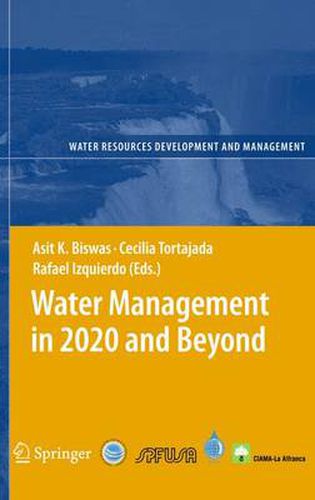Readings Newsletter
Become a Readings Member to make your shopping experience even easier.
Sign in or sign up for free!
You’re not far away from qualifying for FREE standard shipping within Australia
You’ve qualified for FREE standard shipping within Australia
The cart is loading…






This title is printed to order. This book may have been self-published. If so, we cannot guarantee the quality of the content. In the main most books will have gone through the editing process however some may not. We therefore suggest that you be aware of this before ordering this book. If in doubt check either the author or publisher’s details as we are unable to accept any returns unless they are faulty. Please contact us if you have any questions.
Water is intertwined in the daily life of humans in countless ways. The importance of water as a driver for health, food security, and quality of life and as a pillar for economic development is unique. As water affects human lives, the mankind also effects the hydrological cycle, in all dimensions from the local to the global scale. Food production accounts for 90% of water use in developing countries. Hydropower production evokes emotions; yet sustainable energy production is among cornerstones of economic development. The damages caused by floods and droughts are escalating all over the world. The human impacts on ecosystems are increasing as well. Water is largely a political good since a bulk of the mankind lives in river basins shared by two or more nations.These complexities are approached in the book in depth.The analyses include consideration of how developments in seemingly unrelated processes and sectors such as globalisation, free trade, energy, security, information and communication revolutions, health-related issues such as HIV/AIDS, as well as emerging developments in sectors that are linked more conventionally to water, such as population growth, urbanisation, technological development, agriculture, infrastructure, energy, management of water quality and ecosystem health, are likely to affect water management in the future. For the first time, a pragmatic attempt is make to define a realistic framework for water management in 2020 with leading experts from different parts of the world as well as different disciplines.
$9.00 standard shipping within Australia
FREE standard shipping within Australia for orders over $100.00
Express & International shipping calculated at checkout
This title is printed to order. This book may have been self-published. If so, we cannot guarantee the quality of the content. In the main most books will have gone through the editing process however some may not. We therefore suggest that you be aware of this before ordering this book. If in doubt check either the author or publisher’s details as we are unable to accept any returns unless they are faulty. Please contact us if you have any questions.
Water is intertwined in the daily life of humans in countless ways. The importance of water as a driver for health, food security, and quality of life and as a pillar for economic development is unique. As water affects human lives, the mankind also effects the hydrological cycle, in all dimensions from the local to the global scale. Food production accounts for 90% of water use in developing countries. Hydropower production evokes emotions; yet sustainable energy production is among cornerstones of economic development. The damages caused by floods and droughts are escalating all over the world. The human impacts on ecosystems are increasing as well. Water is largely a political good since a bulk of the mankind lives in river basins shared by two or more nations.These complexities are approached in the book in depth.The analyses include consideration of how developments in seemingly unrelated processes and sectors such as globalisation, free trade, energy, security, information and communication revolutions, health-related issues such as HIV/AIDS, as well as emerging developments in sectors that are linked more conventionally to water, such as population growth, urbanisation, technological development, agriculture, infrastructure, energy, management of water quality and ecosystem health, are likely to affect water management in the future. For the first time, a pragmatic attempt is make to define a realistic framework for water management in 2020 with leading experts from different parts of the world as well as different disciplines.